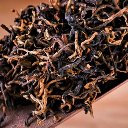Tea: Assamica Black Tea from Mei Zi Qing Village
A Yunnan Gold from Yunnan Sourcing
| Brand: | Yunnan Sourcing |
| Style: | Yunnan Gold |
| Region: | Yongde, Yunnan, China |
| Caffeine: | Caffeinated |
| Loose? | Loose |
| # Ratings: | 1 View All |
| Product page: | Assamica Black Tea from Mei Zi Qing Village |
Reviewer: Alex Zorach

✓ 1453 teas reviewed
✓ 27 of Yunnan Gold
✓ 42 of Yunnan Red
✓ 33 of Yunnan Sourcing
✓ 1 from Yongde, Yunnan, China
✓ 81 from Yunnan, China
Review of Assamica Black Tea from Mei Zi Qing Village
January 8th, 2023
| Aroma | Flavor | Value | Total |
| 8 of 10 | 3 of 5 | 3 of 5 | 73 of 100 |
| Excellent | Fair | Reasonable |
I tried this tea right when I ordered it, but did not like it. It had few objectionable qualities, and was actually quite smooth, but simply seemed a little boring. However, I set it in my cupboard for quite some time and sure enough, it has started tasting more interesting after about a year and a half. Still, it is not my favorite and I thought it was expensive relative to how much I enjoyed it.
The dry leaf has a rather different aroma from most of the Yunnan red teas I've tried. The smell reminds me a lot of the larger-leaf Assam teas I ordered from TeaOrb a while back. There is more of a fermented (and I mean fermented, not oxidized) smell, a sort of smell reminiscent of decaying autumn leaves, with some deep fruity and herbaceous notes.
The brewed cup is very interesting. The flavor is exceptionally smooth, in my opinion, too much so. I prefer teas to have a bit more body. However the smoothness allows you to brew this tea more strongly, to bring out more complexity in the flavor. The flavor is quite sweet, and lightly savory/umami, but there is little bitterness or sourness. At times the cup reminds me of some Japanese green teas, flavor-wise.
The aroma has a lot going on, but is subtle. Fleeting notes appear, vanish, then reappear. Notes include a nice floral honey, autumn leaves (less than from the smell of the dry leaf), and fruitiness but it's hard to pin down on a specific fruit. The fruitiness of the brewed cup is more like fresh fruit, contrasting with the dry leaf which suggested dried fruit. One thing that was interesting to me about aging is that I found after letting this tea sit for about a year and a half, the floral notes seemed stronger, which surprised me, as those notes are often not the type that stick around in a tea's aroma as you age it.
The tea resteeps well. Some aromatic notes come out in the resteeps that were not present initially, such as cinnamon notes or notes of wood, faintly smoky. Some of the subsequent steeps can have a more oolong-like character. However I think it may be exaggerating to say this can be steeped 8+ times gong fu style. Perhaps this tea just wasn't suited for my tastes, but I found because it was too smooth and lacked the bitterness that I often seek out in tea, I found it gave out much earlier than that. But I also thought that all steeps were somehow unsatisfying to me, no matter how I brewed it.
This tea was interesting, and I can recognize that quality craftsmanship went into its production, but in the end I did not enjoy it as much as the robust Yunnan teas. Some of them had at least as much aromatic complexity, but more body and flavour. I also thought it was quite pricey. Some of my favorite teas from Yunnan Sourcing cost little more than half as much as this one, yet I enjoy them much more. So, for someone with my taste, I thought this was overpriced.
Someone who likes very smooth, sweet, mellow teas and dislikes bitterness and astrigency might enjoy this one more.


